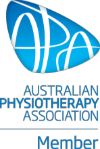What can physiotherapy do for a Rotator Cuff tear?
A physiotherapist can assess your shoulder function and rotator cuff activity to determine if further investigations such as diagnostic Ultrasound or MRI are needed. Best management of a rotator cuff tear will be determined based on a number of factors including area and size of tear, remaining muscle function and the person’s activity requirements.
A conservative approach to treating a rotator cuff injury will involve addressing all factors that may have contributed to tendon pathology. Physiotherapy can help with targeted treatment and exercises to address scapula muscle weakness, joint stability cuff weakness as well as improving neck and thoracic spine function to help reduce overload of rotator cuff tendons. A partial cuff tendon tear will not heal itself but by improving balance across shoulder girdle progress of a tear might be reduced.
Where a cuff tear needs to be surgically repaired, your physiotherapist will guide you through rehabilitation process. Part of this guidance is making sure you understand importance of adequate protection of repair in weeks following surgery.
More shoulder questions
How may physiotherapy help an injured shoulder?
What causes a frozen shoulder?
How do you treat a frozen shoulder?
What does the Rotator Cuff do?
What can physiotherapy do for a Rotator Cuff tear?
Why is the scapula (shoulder blade) important?
What is a winging scapula?
What is sub-acromial impingement?
How can physiotherapy treatment help sub-acromial impingement symptoms?
Do I need to stop training in the gym if I have shoulder pain?
Are there certain gym exercises that are bad for shoulders?
Do I need to do exercises for my sore shoulder?

